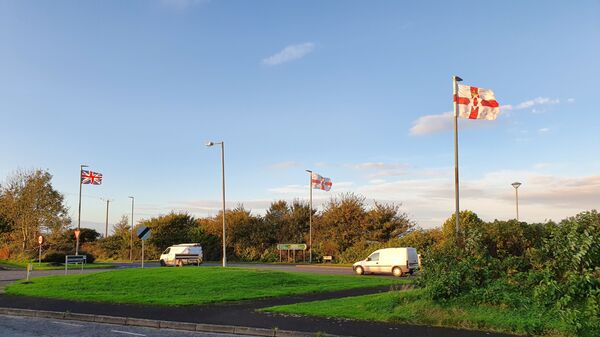The managing director of Ireland’s biggest sportswear manufacturer has said Boris Johnson has “shafted” the Democratic Unionist Party and could have paved the way for a united Ireland in a few years.
On Thursday, 17 October, the DUP withdrew its support for the deal only hours before it was finally agreed with the EU, saying it threatened the integrity of Northern Ireland’s place within the United Kingdom.
👇🏻 “The Democratic Unionist Party will be unable to support these proposals in Parliament.” pic.twitter.com/zcisdSLkPy
— DUP (@duponline) October 17, 2019
The deal would create a customs union on the island of Ireland which would mean the North would effectively remain within the EU and separate from the rest of the UK.
Kieran Kennedy runs O’Neills, who employ 900 people on the island of Ireland - 720 of them at their factory in Strabane in Northern Ireland.
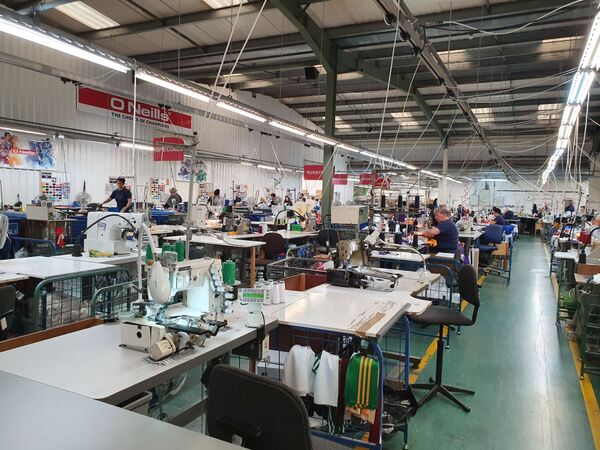
He said: “The DUP has backed the wrong horse. The DUP has pushed us as a nation nearer to become a united Ireland than ever before.”
Mr Kennedy, who comes from an Irish nationalist background, said he would like to see a united Ireland and he felt the DUP had been manipulated by the Conservative Party and had “played into the hands” of Sinn Fein.
Charles Moore, a beef, sheep and cereal farmer in County Fermanagh, agreed: “Boris Johnson doesn’t give a toss about us….Brexit is going to be a major stumbling block. Northern Ireland is weaker within the union than it was before.”
📝 @BorisJohnson has negotiated a new deal.
— Conservatives (@Conservatives) October 17, 2019
👍 Now MPs in Parliament just have to back it.#GetBrexitDone#TakeBackControl pic.twitter.com/xI86vf2iaW
Mr Moore said a lot of farm trade was carried out over the border.
“Lambs from the North are usually processed and slaughtered in the Republic and then sent to Paris. My son’s lambs are processed (across the border) in Navan and I have customers come across the border to buy barley and wheat from me,” Mr Moore said.
Mr Moore, a Remainer, said he believed a hardcore of English nationalists within the Conservative Party were threatening the future of the UK itself: “They’re a bunch of public schoolboys from the south of England who don’t give a toss about the periphery, including the north of England.”
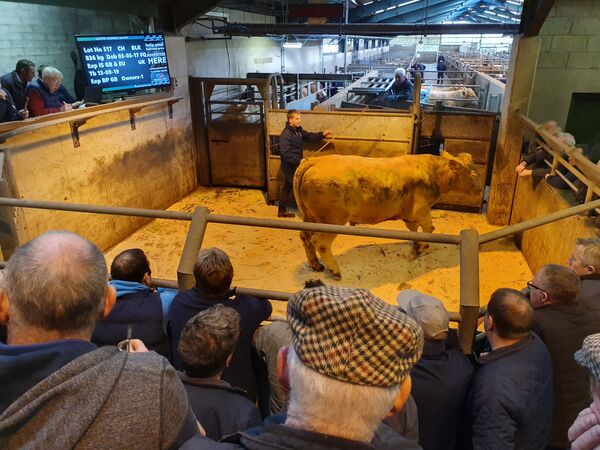
He said Mr Johnson had often promoted the idea of a free trade agreement with the United States, something President Donald Trump has welcomed.
But Mr Moore said: “They still use growth hormones in the US to finish their cattle. They were banned by the EU in 1981 and we don’t want them back. The average farm in Fermanagh is 100 acres but in the US the average is about 1,000 acres so they have huge economies of scale. If there was a free trade agreement we’d be wiped out by US imports. Supermarket customers would buy the cheaper beef.”
📺 Following a meeting with Tánaiste Simon Coveney this afternoon, Sinn Féin President @MaryLouMcDonald said she is 'satisfied that there will be no hard border on the island of Ireland, and no veto will be given to the DUP'. #BrexitDeal pic.twitter.com/ocugASUHJF
— Sinn Féin (@sinnfeinireland) October 17, 2019
He said Northern Irish farmers were also facing the loss in 2021 of EU Single Farm Payments, a subsidy which keeps some farms afloat.
At the weekly cattle auction in Enniskillen on Thursday farmers from both sides of the border were present to bid for heifers, bullocks, calves and breeding cows.
Arthur Ferguson, a semi-retired farmer from Lisnaskea, said: “Brexit is an awful disaster. We should have went with Theresa May’s deal in the first place. It was a good deal for everybody in this part of Ireland.”
Mr Ferguson, who said he had bought and sold hundreds of animals from and to the Republic of Ireland, said: “We are being held up by the DUP who don’t give a damn about farmers or anybody else. The DUP are holding the country to ransom.”
Stewart Johnston, the owner of Ulster Farmers Mart, which runs the auction, said the price of cattle has fallen by around £150 per head in the last year, partly as a result of the uncertainty over Brexit.
Asked about how the new Brexit deal would affect the cattle and sheep industry, Mr Johnston said: “I’m totally confused with the whole thing. Everybody is worried and confused.”
The market deals with around 700 or 800 heads of cattle a week and between 500 and 1,000 sheep.
He said most of the trade is among locals but some farmers from the Republic come to buy and sell and the market accepts euros as well as pounds.
Mr Johnston said: “Everybody wants a deal on Brexit and the sooner the better but we’re worried about what a deal might contain.”
He said he did not want to comment on party politics because he had customers who were both DUP and Sinn Fein voters.
Paul Gosling, a financial journalist and author of A New Ireland, said: “The quickest way to create a border is to make a free trade deal with the US because of their lower animal welfare standards and rules on GM crops. That stuff is not allowed in the EU and you’d need a hard border.”
He said: “If you work on the assumption that supporters of Brexit want a low tax, low regulation economy then some of that is damaging to Northern Ireland because a third of our exports are food.”
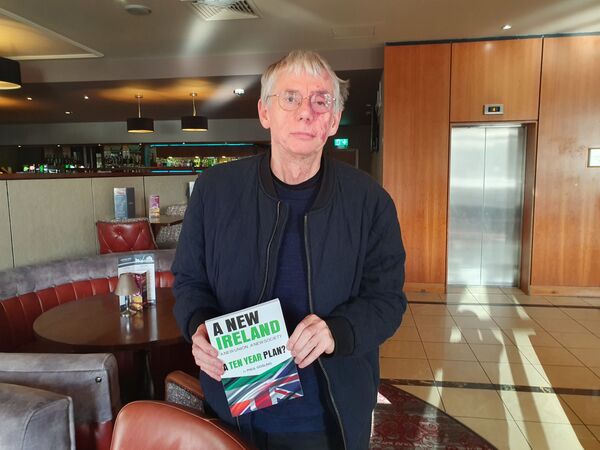
But Mr Gosling said that if Northern Ireland remains inside the EU customs union while still being in the UK customs union then it could give Northern Ireland an “advantage” and that certainly seemed to be the case on Thursday with the SNP outraged at the new Brexit deal, which they fear would cause investors to opt for Northern Ireland over Scotland.
In his book Mr Gosling argues it makes more sense in the long term for Northern Ireland to be part of a united Ireland within the EU.
He said: “I’m not optimistic about the UK economy, while the EU is strong. The traditional reasons for not wanting to join the Republic were to do with the dominance of the Catholic Church but that is no longer the case, as you can see by the recent referendums on abortion and same sex marriages. The North is weak and dependent on financial support from the UK and with the rise of English nationalism that subsidy is unlikely to be there for ever.”
Mr Gosling said the main obstacle to the unification of Ireland, apart from the opposition of a loyalist paramilitary hardcore, was the absence of a national health service in the Republic, something which is cherished in the North.
Mr Kennedy said if the deal creates a customs union on the island of Ireland he welcomed it because it would allow him to continue his business unfettered.
“We import multifibre yarn from China through the port of Dublin, it is then brought across the border to Strabane and processed and sent back to Dublin. Between yarn and finished product it crosses the border eight times,” Mr Kennedy said.
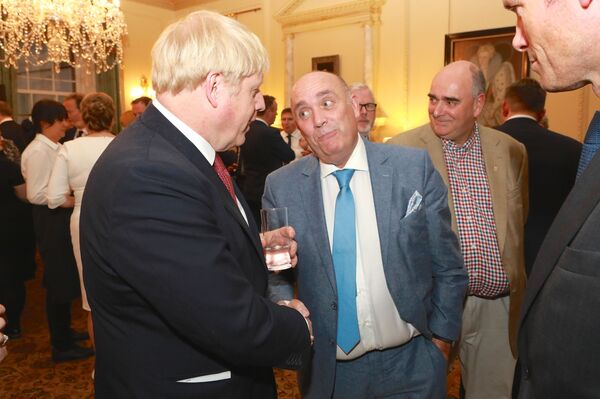
“I am old enough to remember when I started out here as a van driver in 1979 and I had to fill in customs forms and take them to the British customs post in Strabane and then stop at the Irish customs post in Lifford. The 14 mile journey to Letterkenny would take me three hours,” he said.
Mr Kennedy said: “The DUP does not speak for Northern Irish businesses or the majority of people in Northern Ireland. For the DUP Theresa May’s deal was better because it did not have a border in the Irish Sea. Everybody knew that Boris was going to shaft them. It was just a matter of time.”

